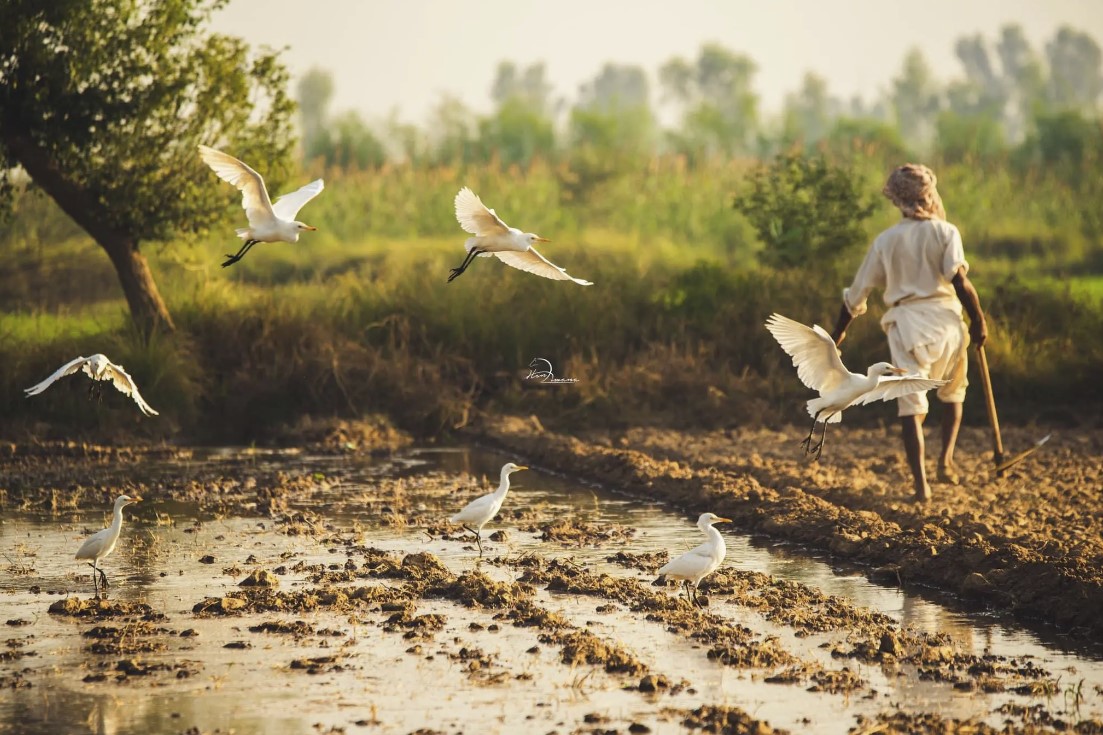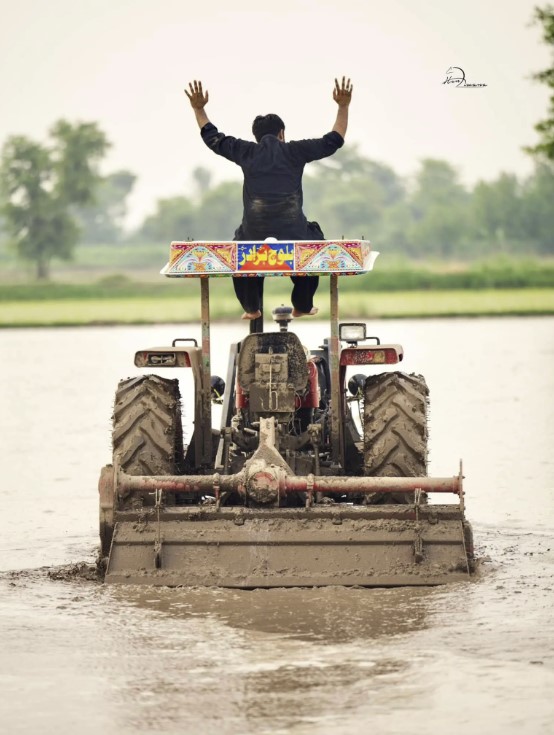You must have seen many pages on social media where the local culture of rural areas of Punjab is posted in the form of beautiful pictures and videos. One of the first youths to popularize this trend is Hasan Talal Towana.
Fields, canals, rivers, animals, birds, farmers and silent scenes of rural Punjab immersed in the evening color tell many stories in Hasan Tawana‘s photography. Immerse yourself in the scene while looking at the picture of the past that is very close to your heart. Keep looking at Hasan’s pictures on Facebook or Instagram for a while, and suddenly your heart will want to leave everything behind and return to the world we left behind in the name of ‘progress’.
Hasan Tawana provides a window through which we can peer into the past, explore our childhood, and relive the world of the past.

Hasan Tawana received great acclaim not only in Pakistan but also abroad (Hassan Tawana).
Hasan Tuana belongs to village 58 North in Sargodha. Didn’t get formal training in photography, just became a fan of passion. Today, he has become so expert in his art that he teaches the nuances of photography to students in various universities and conducts workshops.
Speaking to Independent Urdu, Hasan Tawana told about his trip that ‘from childhood he came to see farmers, how they work in difficult conditions, he wanted to show their lives and hard work to the world.’
This section contains related reference points (Related Nodes field).
Do you click along the way or do you regularly plan and go to the same place over and over again? In response to this question, he said that ‘maybe sometimes I am so lucky that I went to a place for the first time and immediately took a picture. Never felt nervous.’
Hasan Tawana was well received not only in Pakistan but also abroad. Many embassies have organized exhibitions of his photographs. He also decorated the PIA calendar with his pictures.

Hassan did not capture the disappearing scenes, but recreated the activities that have become part of the past and then preserved them with the eye of the camera (Hassan Tawana).
On the love received from Punjab across the border, Hasan Talal Towana says, ‘When I started, the biggest response came from the Sikh community of Indian Punjab, the cricketers, singers, sectors and other people from there got a lot of love. gave Maybe I’m more popular there than here. Most people start crying.’
His fans range from the common man to Indian celebrities like Sonam Bajwa and Shikhar Dhawan.
How to make pocket money with photography?
People buy prints of my photos, put them up in hotels, most of the buyers are Pakistanis living abroad. I recreate and show them what they saw in their childhood.’
He further says that ‘Life is changing very quickly, many things have disappeared before our eyes, I want to preserve them. The implements that have been part of our farmers’ lives for the last hundred years, to suddenly throw them away now that a new machine has arrived, hurts an artist. I want to preserve from the camera’s eye all the scenes that are in danger of being erased.’
Hasan not only captured the disappearing scenes but also recreated the activities that have become part of the past and then preserved them with the eye of the camera. For example, children flying kites from trees, or depictions of children engaged in various traditional sports.
Hasan Tawana’s photography universe is vast, emotional and full of quality. Visiting their wall is like having a therapy session, a relaxation that never comes back.
#Photographer #capturing #scenes #Punjabs #rural #culture
**How do you believe your background and experiences influence your perspective as a photographer?**
**Interview with Hasan Talal Towana: A Photographer Capturing the Essence of Rural Punjab**
**Interviewer:** Thank you for joining us, Hasan. Your photography has resonated with many people, especially those who cherish the cultural beauty of rural Punjab. Can you tell us a bit about what inspired you to start this journey?
**Hasan:** Thank you for having me! My journey started rooted in my childhood experiences. Growing up in village 58 North in Sargodha, I witnessed the hard work of farmers and the beauty of their daily lives. I wanted to show the world the resilience and spirit of these communities. Photography became my medium to express these stories and preserve the essence of our surroundings.
**Interviewer:** You mentioned that you didn’t have formal training in photography. How did you develop your skills?
**Hasan:** It was purely passion-driven. I spent countless hours observing different scenes and experimenting with my camera. Over time, I learned through practice and by sharing knowledge with others. Now, I’m fortunate enough to teach photography at various universities and conduct workshops, which helps me pass on what I’ve learned.
**Interviewer:** Your photographs depict serene landscapes and the daily lives of farmers. How do you approach capturing these moments? Do you plan your shots, or is it more spontaneous?
**Hasan:** It’s a bit of both. Sometimes, I’ve gotten lucky and captured a remarkable shot the first time I visited a place. Other times, I return to locations, waiting for the perfect lighting or moment. I try to immerse myself in the environment, letting the scene unfold before me.
**Interviewer:** Your work has gained international acclaim, even earning recognition from communities across the border in India. What has that response been like for you?
**Hasan:** It’s been overwhelming and heartwarming. When I started, the Sikh community in Indian Punjab was particularly supportive. The warmth and appreciation I’ve received from them have been incredibly emotional. Many people connect with the nostalgia of the scenes I capture, often expressing their feelings through tears.
**Interviewer:** Your photography not only captures moments but also tells stories. How do you see your role as a photographer in the context of preserving culture?
**Hasan:** I see myself as a storyteller and a bridge to the past. My goal is to revive memories and bring attention to the disappearing landscapes and traditions. By sharing these images, I hope to foster a deeper appreciation for our culture and history, encouraging others to remember where we come from amid modernization.
**Interviewer:** Hasan, thank you for sharing your insights. Your journey exemplifies the power of art in connecting cultures and preserving memories. We look forward to seeing more of your work.
**Hasan:** Thank you for the opportunity! I’m excited to continue sharing the stories of rural Punjab and hope to inspire others to appreciate our rich heritage.
